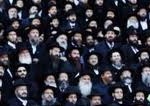Orthodoxy today – Ask the Rabbi
Q. What is the state of Jewish Orthodoxy today?
 A. British Jewry recently produced a report that confirms what many of its leaders have been feeling for years, that young people are more Orthodox than their elders.
A. British Jewry recently produced a report that confirms what many of its leaders have been feeling for years, that young people are more Orthodox than their elders.
Once upon a time the growing movements were the Reform and Liberal (in some places the two terms are basically identical; in Britain the Reform group is more traditional, almost but not quite like Conservatism in the USA, and the Liberals are more radical).
Both groups still have large numbers of adherents, but strict Orthodoxy is on the road to matching, overtaking and eclipsing them (another qualification: “establishment” Orthodoxy in Britain used to be known for a rather lax kind of commitment, but that is now receding into history).
The difference between non-Orthodox and Orthodox is both quantitative, and qualitative. Quantitatively, it’s the Orthodox who are producing large families. In addition, it’s they who gain the ba’alei t’shuvah – the Jews who return from the periphery.
Qualitatively, they are the ones that have the visibly growing rates of Jewish learning, commitment and observance, and the resurgence of Jewish intellectuality.
An Australian professor of science once said to me, “I’m not religious, but if I were I’d be Orthodox”. Orthodoxy stands for something and does not try to be all things to all people.
One of the weaknesses of Conservatism, Reform and Liberalism is that their adherents tend to choose them for negative more than positive reasons – “It’s not because of what I believe and do,” an Australian Liberal Jew told me, “but it’s because I’m not Orthodox… I don’t keep Shabbat strictly, I don’t keep kosher, I don’t like Orthodox synagogues”.
Not that Orthodoxy has all the cards. Some of its sub-groups – and, unfortunately, some of its rabbis – give belief and observance a bad name. Narrowness and intolerance are unpleasant to behold. It’s only a minority that allow themselves these habits, but that’s already a problem.
Further, being or becoming Orthodox sometimes means disengaging from the world. It’s not only that some of the Orthodox can’t hide their feeling of superiority towards other Jewish group; they can’t hide their superiority complex towards the wider world.
There’s also the problem of cultural narrowness. It shocked me to find a young Australian Orthodox Jew who had never heard of the Aboriginals. If he knows any music it may be Chassidic melodies and even Carlebach, but Mozart and Beethoven are not on his horizon. He has learnt Rambam but not Plato. Even Jewish thinkers are beyond his ken: maybe he knows Tanya but not Rosenzweig or even Soloveitchik.
Orthodoxy never over-simplified or shied away from ideological challenges. It met them head-on.
Today’s Orthodox academics tend to choose “safe” subjects. They don’t mind mathematics and some of the sciences – but literature or history often raise too many difficult questions.
The pendulum is swinging towards Orthodoxy. Let’s hope it finds some balance.



